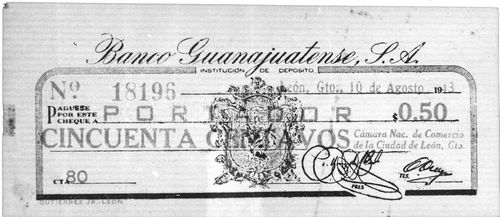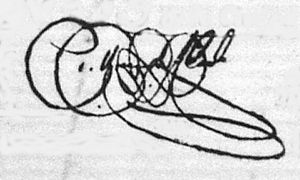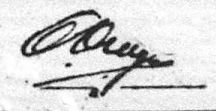The crisis of 1943
In 1943, during the Second World War, Mexico was again faced with a silver crisis (there was a combination of reasons: anticipation of a rise in the price of silver; the Mexican government’s agreement to sell practically its entire silver production to the United States for its military industry; and a boom in the Mexican and US jewellery industries). On 21 August it imposed a heavy export tax on silver products, to make it unprofitable to melt down silver coins to ship as bullion, and temporarily suspended a contract which promised all surplus silver production to the United States. However because of a shortage of fractional coinage, especially the fifty centavos denomination, it was compelled to authorise banks to issue cheques with printed denominations of twenty-five and fifty centavos. All these issues were quickly withdrawn.
León
Cámara Nacional de Comercio de León drawn on the Banco Guanajuatense, S. A

M4297 50c Banco Guanajuatense
| from | to | total number |
total value |
||
| 50c | includes number 18196 |
The Banco Guanajuatense, S. A. was a savings bank (institución de depósito y ahorro) headquartered in León, with its offices on the corner of calle Juárez and pasaje Padilla. The local Cámara Nacional de Comercio issued a series of 50c cheques, drawn on the bank and dated 10 August.
This example was signed by [ ][identification needed] as Presidente and [ ][identification needed] as Tesorero.
 |
|
 |
San Felipe
San Felipe, known colloquially as San Felipe Torres Mochas, is 50 kilometres north of Guanajuato. In 1943 it was officially known as Ciudad Dr. Hernández Alvarez.
On 7 September the correspondent of Ecos de Guanajuato reported that the lack of fractional currency had grown worse in this town. Merchants, in order to facilitate sales, had put into circulation vales for fifty and twenty-five centavos, with the approval of the local Cámara de Comercio, which were generally accepted though some merchants rejected them or insisted that holders spent the whole of their valueEcos de Guanajuato, Año III, Núm. 113, 12 September 1943.
